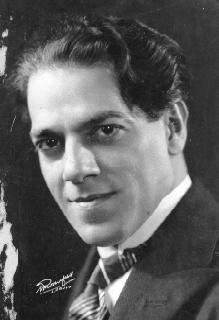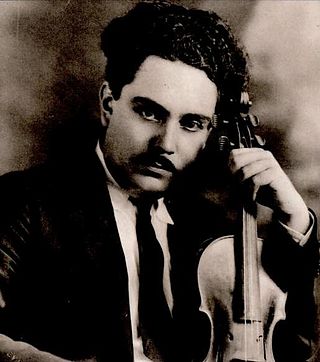
String Quartet No. 10 is one of a series of seventeen works in the genre by the Brazilian composer Heitor Villa-Lobos, and was written in 1946. A performance lasts approximately 23 minutes.

String Quartet No. 10 is one of a series of seventeen works in the genre by the Brazilian composer Heitor Villa-Lobos, and was written in 1946. A performance lasts approximately 23 minutes.
Villa-Lobos composed his Tenth Quartet in Rio de Janeiro in 1946. It was first performed by the Quarteto de São Paulo in Paris on 12 February 1950. The score is dedicated to Mindinha (Arminda Neves d'Almeida), the composer's companion for the last 23 years of his life. [1]
The quartet consists of four movements:
The formal structure of the first movement is derived from the classical sonata-allegro form, and has three subjects. [2]
Cyclic procedures are used to promote unity across the four movements. A violin arpeggio flourish from the end of the fourth bar of the first movement, for example, is developed extensively in the Adagio, and the prominent repeated chords of the first movement return in the scherzo and, in slower rhythmic values, in portions of the finale. [3]
Chronological, by date of recording.

Música de feria is a composition for string quartet by the Mexican composer and violinist Silvestre Revueltas, written in 1932. Though not so titled by the composer, it is sometimes referred to as his String Quartet No. 4. A performance lasts a little more than nine minutes.

String Quartet No. 2 (Magueyes) is a chamber-music work by the Mexican composer and violinist Silvestre Revueltas from 1931. The score is dedicated to Aurora Murguía and a performance of it lasts between ten and eleven minutes.

String Quartet No. 1 is the first of seventeen works in the genre by the Brazilian composer Heitor Villa-Lobos, originally written in Nova Friburgo in 1915 and extensively revised in 1946. A performance lasts approximately eighteen minutes.

String Quartet No. 2 is the one of a series of seventeen works in the genre by the Brazilian composer Heitor Villa-Lobos, and was written in 1915. A performance lasts approximately twenty minutes.

String Quartet No. 3 is the third of seventeen works in the medium by the Brazilian composer Heitor Villa-Lobos, and was written in 1916. A performance lasts approximately twenty-three minutes.

String Quartet No. 4 is the fourth of seventeen works in the genre by the Brazilian composer Heitor Villa-Lobos, written in 1917 and revised in 1949. A performance lasts approximately 23 minutes.

String Quartet No. 5 is the fifth of seventeen works in the genre by the Brazilian composer Heitor Villa-Lobos, written in 1931. A performance lasts approximately 17 minutes.

String Quartet No. 6 ("Brazilian") is one of seventeen works in the genre by the Brazilian composer Heitor Villa-Lobos, and was written in 1938, in between his early and late periods. Villa-Lobos considered naming it "Quartet Popular No. 2" as opposed to "Brazilian," and while the work is indeed one of his more nationalist pieces, it also bears direct connections to the Viennese tradition of string quartet composition. A performance lasts approximately 24 minutes.

String Quartet No. 7 is the seventh of seventeen works in the genre by the Brazilian composer Heitor Villa-Lobos, written in 1942. With a performance lasting approximately 37 minutes, it is the longest of Villa-Lobos's string quartets

String Quartet No. 8 is one of seventeen works in the genre by the Brazilian composer Heitor Villa-Lobos, written in 1944. A performance lasts approximately twenty-five minutes.

String Quartet No. 9 is part of a series of seventeen works in the medium by the Brazilian composer Heitor Villa-Lobos, and was written in 1945. A performance lasts approximately 25 minutes.

String Quartet No. 11 is a 1947 string quartet, part of a 17-work series in the medium by Brazilian composer Heitor Villa-Lobos. A performance lasts approximately 27 minutes.

String Quartet No. 12 is the part of a series of seventeen works in the genre by the Brazilian composer Heitor Villa-Lobos, and was written in 1950. A performance lasts approximately twenty-two minutes.

String Quartet No. 13 is one of a series of seventeen works in the medium by the Brazilian composer Heitor Villa-Lobos, and was written in 1951. A performance of it lasts approximately twenty minutes.

String Quartet No. 14 is the one of a series of seventeen works in the medium by the Brazilian composer Heitor Villa-Lobos, and was written in 1953. A performance lasts approximately seventeen minutes.

String Quartet No. 15 is one of a series of seventeen works in the medium by the Brazilian composer Heitor Villa-Lobos, and was written in 1954. A performance lasts approximately nineteen minutes.

String Quartet No. 16 is the penultimate of seventeen quartets by the Brazilian composer Heitor Villa-Lobos, and was written in 1955. A performance lasts approximately twenty minutes.

String Quartet No. 17 is the last of seventeen quartets by the Brazilian composer Heitor Villa-Lobos, and was written in 1957. A performance lasts approximately twenty minutes.

The Piano Concerto No. 2, W487, is a piano concerto by the Brazilian composer Heitor Villa-Lobos, written in 1948. A performance lasts about 28 minutes.

The Piano Concerto No. 3, W512, is a composition for piano and orchestra by the Brazilian composer Heitor Villa-Lobos, written in 1952–57. A performance lasts about 26 minutes.